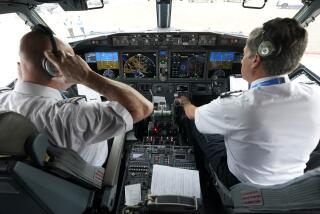Heart Attacks Rarely a Factor in Plane Crashes
- Share via
In both commercial and private aviation, pilot heart attacks are considered the greatest medical threat to flight safety, and underlying heart disease is the most common reason for the Federal Aviation Administration to deny a pilot’s medical certificate. Such a certificate is a prerequisite for any license to fly an airplane.
But while heart disease is rarely a factor in airplane accidents, according to the FAA, there is an ongoing medical debate over whether current medical requirements should be relaxed, tightened, or allowed to remain as they are.
For the record:
12:00 a.m. Sept. 7, 1986 For the Record
Los Angeles Times Sunday September 7, 1986 Home Edition Part 1 Page 2 Column 1 National Desk 2 inches; 53 words Type of Material: Correction
In a Sept. 3 article on air safety, a Federal Aviation Administration official gave The Times incorrect data on the number of annual in-flight accidents and the number of fatalities resulting from the accidents. According to the National Transportation Safety Board, there were 2,935 aviation accidents in the United States in 1985; of those, 538 involved at least one death.
The FAA investigates about 4,000 in-flight accidents each year, about a third of which involve at least one death. But incapacitation of the pilot from heart disease or another medical problem is a factor in only five to 10 of these cases, said Dr. William Hark, manager of the FAA’s aeromedical standards division.
“Pilots do have heart attacks, but not very often,” Hark said in a telephone interview from Washington. “Autopsies are performed on the vast majority of pilots who die (in plane accidents). We are fairly confident we find out about most of the heart problems that occur.”
The medical condition of William K. Kramer, pilot of the Piper Archer that collided with the Aeromexico DC-9, has become a major source of speculation because of a Los Angeles coroner’s office statement that Kramer suffered a heart attack immediately before the Sunday collision--a conclusion challenged as possibly premature by some medical experts.
Tougher Standards
Commercial pilots are subject to more stringent medical standards than private aviators even though more than one licensed pilot is available on most commercial flights to take over in medical emergencies.
The FAA disqualifies people with coronary heart disease and other significant heart conditions from receiving a medical certificate.
Of 732,000 medical exams for new licenses or renewals in 1982 and 1983, 9,100 applicants were denied on medical grounds, 4,546 of them because of heart disease, according to an FAA study. The others were denied for a variety of conditions, such as drug abuse and psychiatric disease.
About 600 denials are appealed to the Federal Air Surgeon in Washington each year. About half of those who appeal are ultimately certified, although some have restricted licenses.
Pilots in command of commercial aircraft hold first-class medical certificates. These must be renewed every six months. Electrocardiograms (EKGs) are required as well as other special medical standards, including hearing and vision tests. EKGs, or tracings of the heart rhythm, often show evidence of heart disease, but are not foolproof.
Kramer, like most private pilots, had a third-class medical certificate, according to Hark. This certificate, which has more lenient medical standards, must be renewed every two years. An EKG is not required.
All commercial and recreational pilots are initially evaluated by an aviation medical examiner--a licensed practicing physician who is certified, but not employed, by the FAA to perform such medical exams.
Kramer’s next scheduled exam was to have been in December, according to Hark. Kramer’s last exam in 1984 showed no “abnormalities.”
The FAA’s standards for civilian aviators were issued in 1959 and revised in 1982.
Those medical standards have been the subject of sharp controversy between pilots, who generally favor more lenient requirements, and many experts in aviation medicine who favor tougher guidelines.
More to Read
Inside the business of entertainment
The Wide Shot brings you news, analysis and insights on everything from streaming wars to production — and what it all means for the future.
You may occasionally receive promotional content from the Los Angeles Times.










